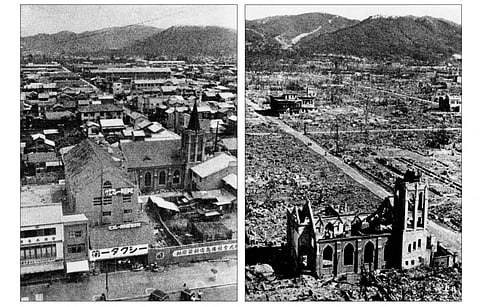Hiroshima at 80: Remembering the bomb, reimagining peace
Survivors urge global nuclear disarmament as memories of Hiroshima and Nagasaki live on

Eighty years after the atomic bombings of Hiroshima and Nagasaki, many of the remaining survivors in Japan are increasingly frustrated by the persistent threat of nuclear weapons and the apparent acceptance of these weapons by global leaders.
The U.S. dropped atomic bombs on Hiroshima on August 6, 1945, and Nagasaki three days later, killing more than 200,000 people by the end of that year. Many others survived but suffered lifelong illnesses caused by radiation exposure.
Approximately 100,000 survivors, known as hibakusha, are still alive today. For decades, many hid their experiences to protect themselves and their families from discrimination, which still lingers in Japan. Others found it too traumatic to speak about their ordeals. Now, as they age, some survivors are courageously sharing their stories in hopes of inspiring a global movement to abolish nuclear weapons.
Kunihiko Iida, 83, who was just three years old and only 900 meters from the bomb’s hypocenter in Hiroshima, volunteers as an English-speaking guide at Hiroshima’s Peace Memorial Park. After 60 years of silence, he now shares his harrowing experience and advocates for nuclear disarmament.
Iida recalls being thrown by the blast and trapped under debris, bleeding from glass shards. His grandfather eventually rescued him, but within a month, his mother and younger sister died from radiation-related illnesses. Despite his health struggles during childhood, Iida has dedicated his retirement to raising awareness, especially among foreign visitors, whom he feels often lack a deep understanding of the bombings.
Earlier this year, he spoke to students across Europe—in Paris, London, and Warsaw—emphasizing the catastrophic consequences of nuclear war and the urgent need for disarmament. “The only path to peace is nuclear weapons’ abolishment. There is no other way,” he said.
Fumiko Doi, 86, narrowly escaped death on the day Nagasaki was bombed when a delayed train spared her from being at the station at the exact moment the bomb exploded. She vividly remembers the flash of light, broken glass raining down, and people suffering horrific burns.
Like many survivors, Doi concealed her identity for years to protect her family from stigma. Her parents and siblings faced serious health challenges, including cancer. Inspired by the 2011 Fukushima nuclear disaster, Doi has since become a vocal participant in anti-war protests, warning of the existential threat posed by nuclear weapons today.
“If one hits Japan, we will be destroyed. If more are used around the world, that’s the end of the Earth,” she warned. “That’s why I grab every chance to speak out.”
The 2023 G7 summit in Hiroshima and the 2024 Nobel Peace Prize awarded to Nihon Hidankyo, a grassroots survivors’ group, have brought renewed international attention to the bombings. Visits to peace museums in Hiroshima and Nagasaki have surged, with roughly one-third of visitors coming from abroad.
American visitor Samantha Anne said she brought her children to understand the devastating impact of a single decision: “It’s a reminder of how much devastation one decision can make.”
Japanese volunteer guide Katsumi Takahashi expressed concern that younger Japanese generations may be losing connection to this painful history, underscoring the importance of survivor testimony.
On a recent day, survivors like Iida shared their experiences with visitors from around the world, making the tragedy of Hiroshima and Nagasaki more tangible. “It’s like sharing a little piece of history,” said Melanie Gringoire, a French visitor, after meeting Iida.
As the world marks 80 years since Hiroshima and Nagasaki, survivors’ voices resonate with urgency: the continued existence and modernisation of nuclear arsenals threaten humanity’s future. Their stories are a solemn reminder that peace is fragile, and the legacy of the atomic bombings must inspire a steadfast commitment to nuclear disarmament before it is too late.
With inputs from AP and Video by AFP



